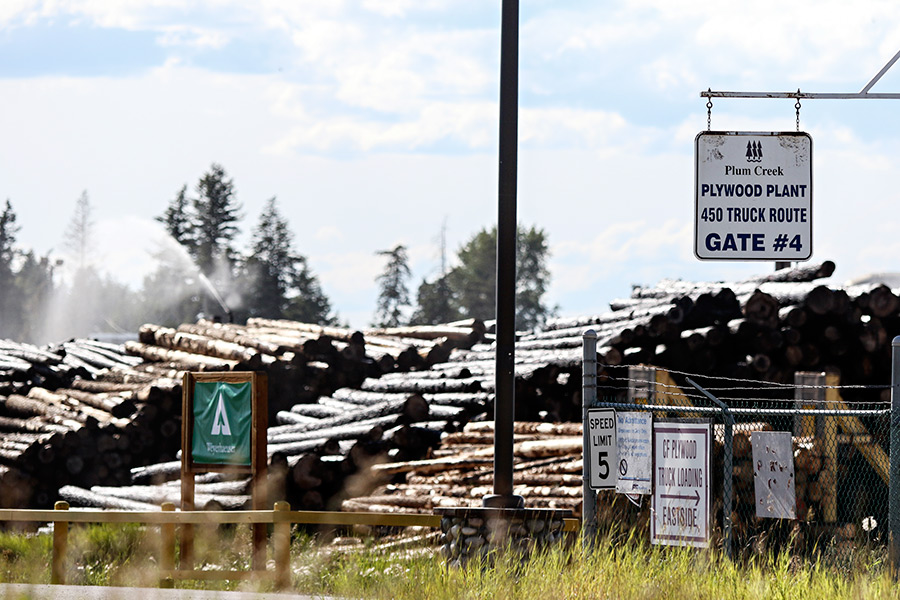The announcement that Washington-based timber giant Weyerhaeuser is unloading its Montana parcels on the cheap continues to raise concerns about how the new owner will manage the 630,000-acre acquisition, despite assurances from attorneys representing the buyer, Georgia-based Southern Pine Plantations, that it won’t step on a longstanding public access agreement or stanch the flow of timber.
For the past month, state lawmakers, industry experts, longtime loggers, and the outdoor recreation community have been fretting over the future of the land, its salable timber and the jobs it provides, as well as whether the new owner will continue the culturally sacred custom of allowing public access to hunters, anglers and other land users.
Rep. Steve Gunderson, R-Libby, brought those concerns to Helena on Jan. 15 when the state Environmental Quality Council convened for its first meeting of 2020, telling its members that the future of the land is uncertain and urging engagement and advocacy from lawmakers to craft an amicable “Montana-built solution.”
Much of the uncertainty is due to the Georgia firm’s history of “flipping” its properties as investments — or purchasing timber land only to sell it to another buyer for development — a practice that has crept close to Montana in recent years, including a real estate deal that gained notoriety in Idaho.
If that’s the case with the Weyerhaeuser land, Gunderson worried that the assurances by Southern Pine will be rendered moot under the ultimate ownership.
“They stated that recreational access would be maintained and more than 500 jobs tied to the flow of timber from those lands would not be in jeopardy,” Gunderson said. “What we do not know about Southern Pine Plantations’ plans is whether it even plans to keep the lands, and if it doesn’t, who is in line to be the next purchaser or purchasers? If Southern Pine is not going to keep the lands, what are those management plans? And what assurances and claims of no impact can be believed?”
His concerns are underscored by the paltry sum Southern Pine is reportedly paying for the land, which at $250 an acre even industry insiders acknowledge amounts to a screaming deal.
Weyerhaeuser has been a household name in this corner of Montana since 2016, when it officially merged with Plum Creek Timber Co., forming the largest private owner of timberland in the U.S., with more than 13 million acres, including at the time 880,000 acres in Montana. Weyerhaeuser purchased Plum Creek for $8.4 billion.
While the transaction was major news for timber management in the state, it also touched a nerve with land users accustomed to Plum Creek’s proven history of allowing public access. After the merger, Weyerhaeuser was quick to address those concerns by renewing Plum Creek’s annual contract with Montana Fish, Wildlife and Parks through the state’s block management program. The agreement, which was voluntarily renewed by Plum Creek for decades, allows hunters and other recreationists to access the private land in exchange for state game wardens patrolling the property.
Last month, an attorney for Southern Pine Plantations said he couldn’t discuss the details of the purchase agreement or the $145 million cash sale, which Weyerhaeuser expects to finalize in the second quarter of 2020; however, he said Southern Pine has “no plan to change the long-standing practices of the prior owners related to public access, forest management, grazing, existing outfitting agreements and conservation easements, and other programs.”
That’s according to James Bowditch, president of Boon Karlberg P.C., who is serving as legal counsel for Southern Pine.
“They really don’t plan to do anything different than what’s being done currently,” Bowditch told the Beacon. “We feel like there was concern that this was a bunch of Wall Street investors buying up property for a quick flip. That is not what is happening at all. This is a timber company and they intend to manage the land for timber. They might even be in a more nimble position than Weyerhaeuser given they are not as large of a company.”
Despite those efforts to assuage concerns, Gunderson remains skeptical and hopes lawmakers, state agencies and other organizations can work together to craft a solution that serves all stakeholders involved.
“We would like to be able to have a discussion with Weyerhaeuser and Southern Pine Plantations, or whoever the ultimate owners are, and sit down with either the county commissioners, the governor or state legislators,” Gunderson said. “We would also like to discuss if there is a possibility of a Montana-built ownership for these lands, and exploring a public-private option so the lands are managed for long-term environmental, social, cultural, and economic health.”
“The sale is much, much more than selling the little blue house on the corner,” Gunderson added.
Marcus Strange of the Montana Wildlife Federation said the sportsmen and wildlife-conservation organization is working on a deal with Weyerhaeuser to finalize an easement west of Kalispell on parcels that will be included in the sale. Strange said the Lost Trail Conservation Easement would provide public access in perpetuity.
“There is currently an easement in the works that would guarantee public access in perpetuity and maintain these timberlands as a working forest,” Strange told the council. “We encourage collaboration in that process and look forward to new opportunities to work together.”
In a joint letter to Weyerhaeuser from state Sen. Scott Sales, R-Bozeman, and Rep. Greg Hertz, R- Polson, the legislators urged the company to consider the cherished legacy of public land access in Montana as it proceeds with the transaction.
“It is our hope that you convey to the next owners of this large piece of Montana timberland that the legislators are eager to develop a working relationship with them and to carry on the tradition of responsible stewardship shown by Weyerhaeuser, and Plum Creek before you,” the letter states.
